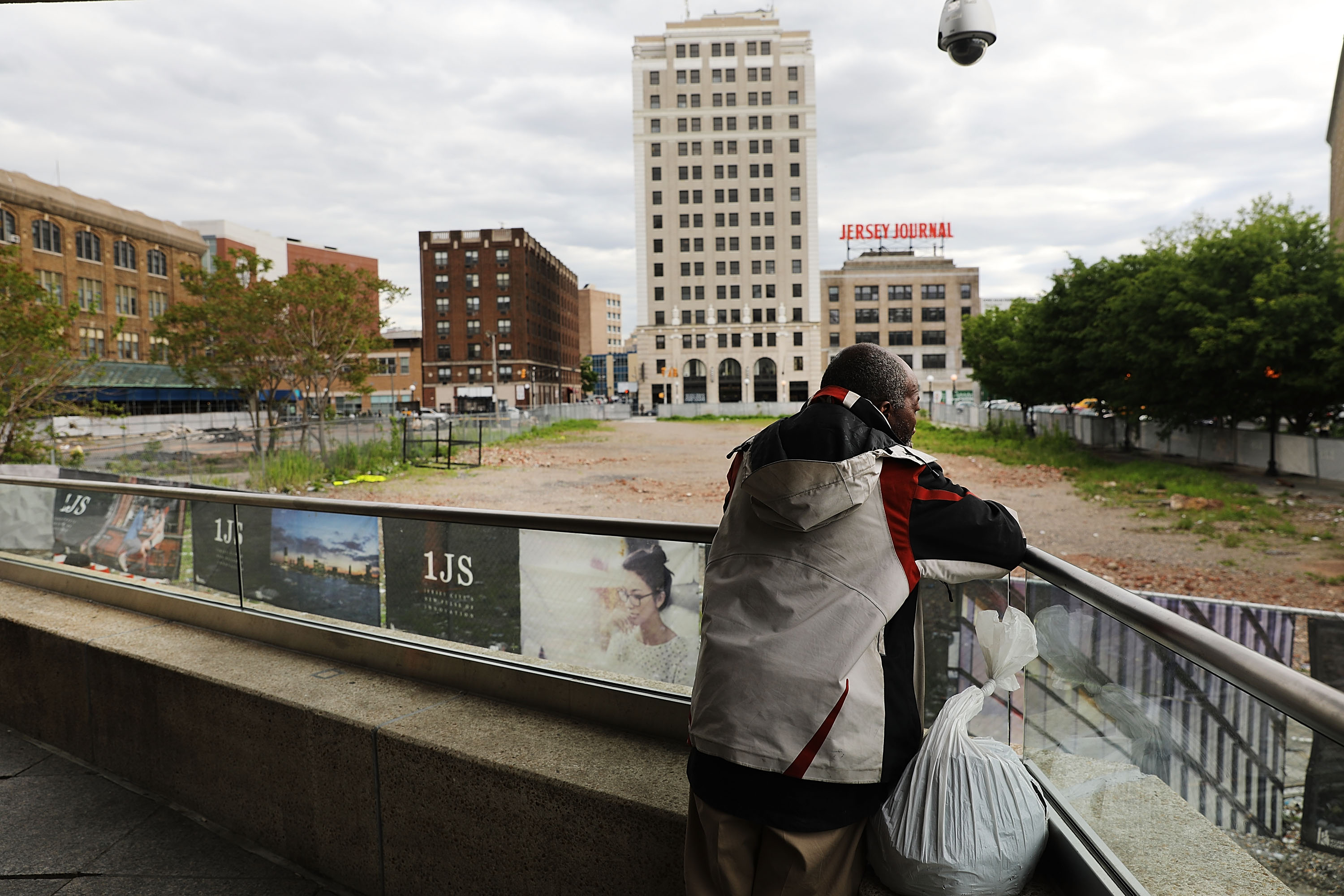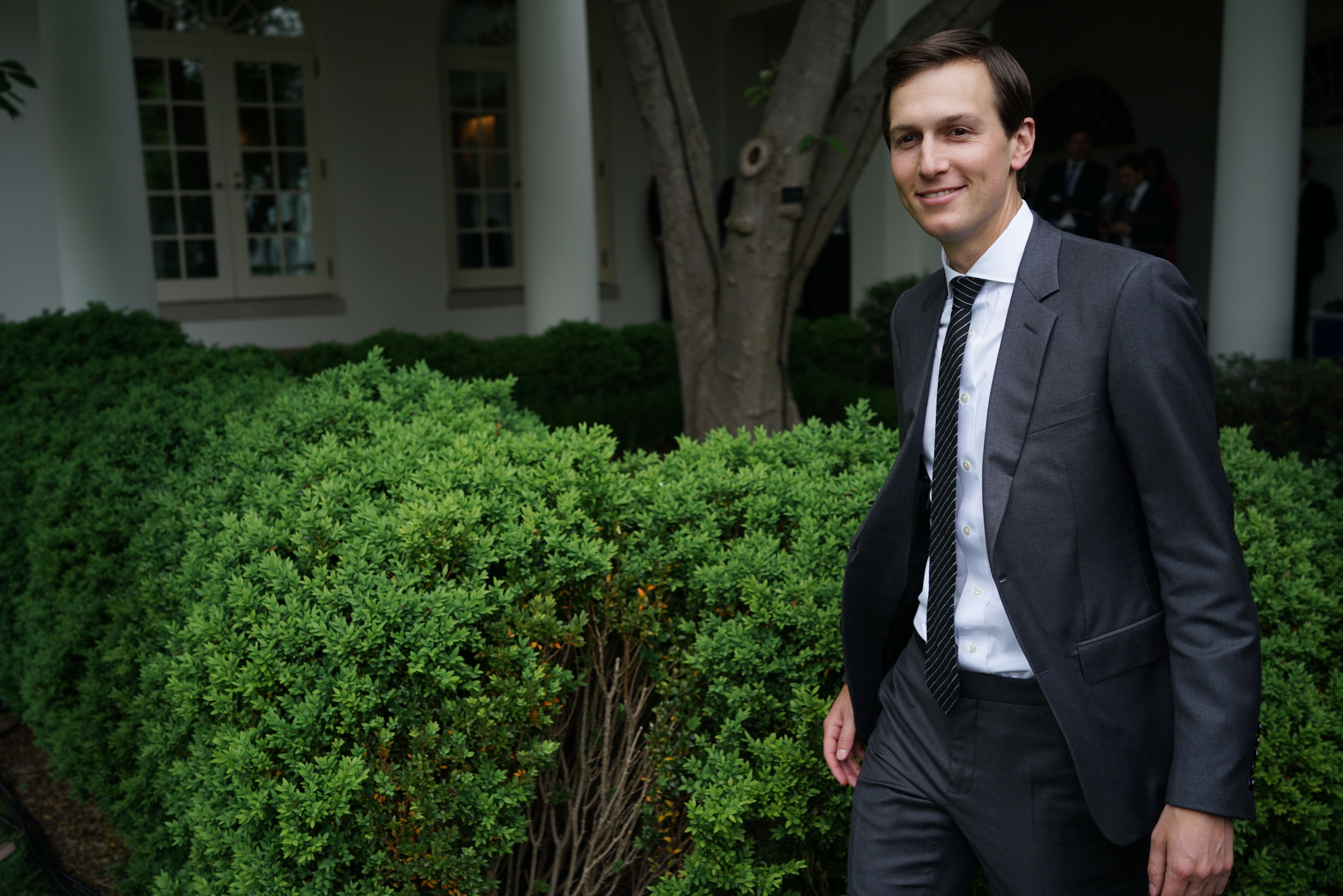
(Photo: Spencer Platt/Getty Images)
A company owned by Jared Kushner’s family apologized on Monday for mentioning his name during promotions for an EB-5 investor project in China this week, after coming under fire in the national press for what some called an attempt to peddle influence and a breach of White House ethics.
The Kushner snafu marks the latest controversy for the EB-5 program; it has, in the past, been cited by the Securities and Exchanges Commission for rampant allegations of fraud that have exploited both rich foreigners seeking American residency and underserved, underdeveloped American communities.
Promoting Kushner Companies’ latest New Jersey real estate development, One Journal Square, at an event in Shanghai for the EB-5 immigration visa—a program whereby wealthy internationals obtain green cards after investing in economic development projects in the United States—Nicole Kushner Meyer mentioned her brother, who had been the company’s CEO until he accepted a position advising (his father-in-law) President Donald Trump, according to reports from the event.
In addition to mentioning her brother’s name, Meyer also showed a photograph of Trump at the event, under a section that listed “key decision makers” of the EB-5 program. The China ordeal comes amid questions over whether wide-reaching foreign business will prejudice the foreign policy stances of Trump and Kushner, who claim to have divested entirely from their respective family businesses.
The vast majority of EB-5 applicants are from China. Many of China’s wealthy and powerful have sought to stash cash abroad and obtain foreign nationalities amid Chinese President Xi Jinping’s anti-corruption campaign, which has upended many in the ruling class—many of them political opponents of his—and cost countless people their life savings.
Members of China’s wealthy class were among those who applied to the Canadian investor visa program after Xi took office in 2012 and launched his contentious anti-graft campaign. In 2014, Canada stopped its visa program amid growing criticism that it was inviting foreign cash without offering any benefits to Canadian communities; though many foreigners partaking in the Canadian program had purchased homes in Canada to claim residency, driving up rents, comparatively few actually lived there. But the main result of the Canadian visa program was skyrocketing rents in urban centers—particularly Vancouver, which had been a traditional hub for East Asian immigration to Canada, analysts say. After the Canadian program was nixed, the U.S. saw a sharp increase in applicants for its own investor immigrant program.
Kushner Companies did not respond to Pacific Standard‘s requests for a copy of the apology issued to CNN and for further comment on its inroads into the Chinese EB-5 market. The Washington Post reported that the event’s Chinese organizers asked correspondents covering the event to leave during the presentations, grabbing one reporter’s phone.
White House Press Secretary Sean Spicer has insisted that, despite references to the administration at the event, Kushner played no role in his family’s bid for Chinese cash.
“As far as I can tell, the Kushner company is operating within the bounds of the law,” says Stephen Yale-Loehr, who teaches immigration law at Cornell Law School and practice business immigration law at Miller Mayer in Ithaca, New York. “But their marketing raises a perception of a potential conflict of interest because Kushner is a senior advisor to Trump. It also raises questions about the purpose of the EB-5 program and whether EB-5 money should go into big urban projects that can raise money without EB-5 investors.”
The EB-5 program was originally launched in 1990 to welcome foreign capital to in-need areas of the U.S. Congress last week extended the program through September, when it is expected to revisit broader questions over the federal budget. Under the program, a foreign investor can obtain a green card if they invest a minimum of $500,000 in a project in an underserved community that creates a certain number of jobs, sustained over several years. By law, investments must be uninsured, meaning the potential immigrant would be barred from financial protections; should they be a victim of a fraudulent project, they would receive no citizenship rights and their money would be lost to an informal sector of the American economy. Meanwhile, the U.S. community that needed development jobs would remain underserved.

(Photo: Mandel Ngan/AFP/Getty Images)
Still, the program is meant to be a boon to all parties involved, Yale-Loehr explains.
“If done correctly, an EB-5 project is a four-way win,” he says. “First, it creates jobs for U.S. workers. Second, it does so at no expense to U.S. taxpayers. Third, it can help project developers find financing for a project that may otherwise be stalled. And fourth, it provides a green card for foreign investors.”
But if past precedent has been any indication, that’s all easier said than done.
In past projects, some go-betweens who connect prospective immigrant investors to projects in the U.S. overstate the potential for the project to successfully lead to a green card or otherwise mislead applicants. Others collect funds to the tune of millions of dollars, but the projects—often hotels and other service-sector businesses—are never even completely constructed after the investment transaction has already occurred.
“The stories highlight the need to reform the EB-5 program,” Yale-Loehr says. “EB-5 is complicated because it requires compliance with both immigration and securities laws. It is a growing industry, and Congress needs to improve it.”
Congress has continued EB-5, but has yet to address resounding calls to modify the system.
“Consensus is growing in Congress to modify the EB-5 program in several ways,” Yale-Loehr says. “One, raise the minimum investment level from the current $500,000 to $800,000 or $900,000; two, restrict the ability of projects to occur in wealthy urban areas; three, create visa ‘set asides’ for EB-5 projects in rural and truly distressed urban areas to hopefully encourage investors to invest in those areas instead; and four, provide greater oversight by the SEC and the immigration agency.”
In 2013, the SEC announced it was undertaking “emergency enforcement action” to address allegations of fraud in EB-5 projects across the country. But allegations of fraud in the program still abound. It remains unclear what, if anything, the SEC can do to prevent fraud in this zero-sum investment scheme.
And with Kushner Companies reportedly using its family ties to the White House to market projects, it also remains unclear whether the ruling administration will actively try to curb misconduct in the program anytime soon.





